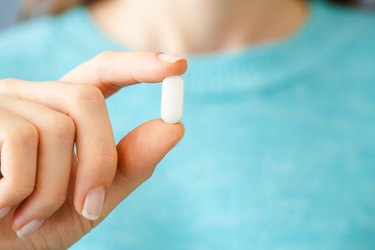
Probiotics can help you maintain a healthy digestive system, keep your gut microbiome in check and reduce gas and bloating. Not too shabby for bacteria, right? But, probiotics can also cause flatulence as a side effect. Choosing the best probiotic for gas may require some experimentation.
Probiotics and Gut Health
Video of the Day
Your body develops bacteria in your gut, and by age 5, the microbiota is fully developed, says Tarek Hassanein, MD, director of the Southern California GI & Liver Centers. Your body does not generally need extra probiotics from fermented foods and supplements to be healthy, according to the Cleveland Clinic. But, eating these types of foods or taking these supplements may help promote the good bacteria already present in your gut.
Video of the Day
Probiotics can be important for some people, including those who have certain diseases or surgeries that interfere with the normal gut anatomy, Dr. Hassanein says. Also, because antibiotics can destroy both good and bad bacteria, probiotics can help replenish the good bacteria.
"They can be helpful for very specific conditions and diseases of the gut, but probiotics are something that is unique to each individual," Dr. Hassanein says. "Just like everything else, everyone's body reacts differently."
Because of this, there's not a one-size-fits-all probiotics recommendation to address flatulence. At this time, research is unclear on which probiotics, or combination of probiotics, work best in treating certain diseases or health conditions, and this remains an area that needs more research, according to the Cleveland Clinic.
In general, though, the Cleveland Clinic recommends opting for probiotic foods over supplements — because researchers are conflicted over whether supplements are effective — unless you're trying to benefit from a strain not found in a food source.
Read more: The Best-Rated Probiotics
Probiotics for Medical Conditions
Many inflammatory digestive tract issues can lead to gas and bloating. Probiotics can help by treating or preventing some of these conditions, thus helping soothe the uncomfortable symptoms.
As an example, probiotics may provide relief for inflammatory bowel diseases such as ulcerative colitis and Crohn's disease, according to the Cleveland Clinic. Probiotics may also be helpful in treating other GI conditions, the clinic says, such as constipation, irritable bowel syndrome, acid reflux and spastic colon.
Foods that Contain Probiotics
Fermented foods contain probiotics that develop during lacto-fermentation, which is when good bacteria feed on sugar and starch in the food to create a lactic acid, according to Harvard Health Publishing.
Additionally, probiotics are added to some foods and can be found in supplements in the form of capsules, tablets and powders. But the National Center for Complementary and Integrative Health cautions that probiotics, like other dietary supplements, don't require Food and Drug Administration approval.
When it comes to food, yogurt tends to be the food most commonly associated with probiotics. But probiotics are also found in buttermilk, miso, tempeh, kefir, kimchi, sauerkraut, some cheeses and many pickles, according to the Cleveland Clinic.
Side Effects of Probiotics
Probiotics may trigger some allergic reactions, according to the Cleveland Clinic, and could cause an upset stomach, diarrhea, flatulence or bloating in the first few days after taking them. The clinic cautions that it may take a little trial and error to find the best probiotic for you. If you don't notice any benefits from a product after a few weeks, try another product with a different bacteria strain.
Also, Harvard Health Publishing recommends taking probiotics at the end of a meal to ease issues like loose stool.
Given that probiotics are already in the body, probiotic foods and supplements are generally considered to be safe, according to the Cleveland Clinic. But people with weakened immune systems or those who've had a surgery need to approach probiotics with caution and consult their physicians.
- Tarken Hassanein, MD, director, Southern California GI & Liver Centers.
- Cleveland Clinic: “Probiotics”
- Cleveland Clinic: “How to Pick the Best Probiotic for You”
- Harvard Health Publishing: “Should You Take Probiotics?”
- Harvard Health Publishing: “How to Get More Probiotics”
- National Center for Complementary and Integrative Health: “Probiotics: What You Need to Know”
Is this an emergency? If you are experiencing serious medical symptoms, please see the National Library of Medicine’s list of signs you need emergency medical attention or call 911.